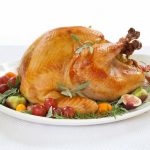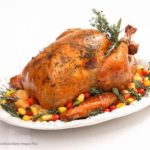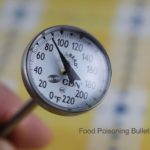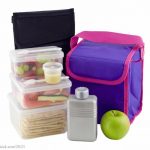These holiday food safety tips from the Centers for Disease Control and Prevention (CDC) will help you celebrate and stay safe and healthy. Christmas and Hanukkah and Kwanza and New Years celebrations typically involve large meals and lots of entertaining. These gatherings warrant special food safety knowledge. Serving a large group of people brings inherent risk. First of all, large quantities of food, especially foods like gravies, can easily be contaminated with bacteria like Clostridium perfringens, which grows in anaerobic environments, like the centers of large batches of food. This pathogen produces a toxin that makes you sick. So it's imperative that you divide large batches of food into small, shallow containers after serving and refrigerate them as soon as possible. And … [Read more...]
Planning to Fry Your Holiday Turkey? Safety First
Are you planning to fry your holiday turkey? If you are, there are some things you need to know. There have been many accidents and injuries associated with this type of cooking over the years. Learn how to fry a turkey safely with these tips. The Consumer Product Safety Commission (CPSC) says that cooking fires are the number one cause of residential fires. And turkey fryers pose particular risks. Since 1998, there have been reports of 222 fire or scald/burn incidents involving turkey fryers. These incidents resulted in 83 injuries and $9.7 million in property loss. To protect yourself, only fry a turkey outside and well away from your home. Prince William County has more tips on turkey frying. While Thanksgiving is the peak day for home fires caused by cooking, Christmas and … [Read more...]
Keep Thanksgiving Leftovers Safe With Tips From the USDA
It's Thanksgiving. One of the best parts of this holiday is leftovers. So you should know how to keep Thanksgiving leftovers safe with these tips from the USDA. When you take foods out of the oven or refrigerator, set a timer and follow the two hour rule. That means that all perishable items such as the turkey, stuffing, side dishes, and desserts should be refrigerated within two hours after coming out of those appliances. After two hours, these foods enter the "danger zone" between 40°F and 140°F, where bacteria can double every 20 minutes. Then, even if you thoroughly reheat those foods, the bacteria could have produced toxins that are not destroyed by heat and can still make you sick. When you break down the foods from the meal, put them into shallow containers so they cool … [Read more...]
Prepare Your Holiday Turkey Safely with Tips From the CDC
It's almost Thanksgiving! Prepare your holiday turkey safely with tips from the Centers for Disease Control and Prevention (CDC). Since turkey can be contaminated with Salmonella bacteria, it must be handled carefully. First of all, store the turkey properly. It should be stored in the freezer until you are ready to thaw it. Do not store a turkey in a car trunk, in snow, or on the back porch. At this point it's too late to properly thaw a large frozen turkey in the fridge, but you can cook it from the frozen state. It takes 24 hours of thawing in the refrigerator for each four to five pounds of turkey. Never ever thaw a turkey or any meat on the counter. The meat will remain in the danger zone of 40°F to 140°F too long, and bacteria will multiply. At room temperature, bacterial … [Read more...]
FDA’s Food Safety and Nutrition Survey Report Released
The FDA's Food Safety and Nutrition Survey, the agency's probability consumer survey designed to assess consumer awareness, knowledge, understanding, and self-reported behaviors regarding food safety, has been released for 2019. The survey was launched to help the FDA make informed regulatory, education, and policy decisions to protect public health. The survey was a mail-push to web methodology. The population includes adults who live in the 50 U.S. states and the District of Columbia. A total of 4,398 responses were collected during ht months of October and November 2019. Before this methodology change, FDA consumer surveys were conducted using phone interviews. The key findings on food safety include consumer knowledge about where they think they may contract food poisoning, … [Read more...]
U.S. Court Strikes Down Kansas Ag-Gag Law As Unconstitutional
The United States Court of Appeals for the Tenth Circuit affirmed a lower court ruling striking down a Kansas Ag-Gag law for violating the First Amendment, according to the Center for Food Safety. The lawsuit was first filed in 2018 by a coalition of food safety advocates, along with animal and environmental groups. Ag gag laws are intended to stop undercover filming in large factory farms by advocates who are trying to expose animal mistreatment as well as food safety violations. Studies have shown that stressing animals can increase the risk of pathogenic bacterial growth, and may lead to more human illnesses. The court held that Kansas may not legislate speech to silence views "critical of animal agriculture." The three provisions of the law targeted speech, not just conduct, … [Read more...]
Is It Safe to Partially Cook Meat and Poultry Ahead of Time?
Labor Day is the last big grilling holiday of the summer season. Most Americans love to grill, and cook out whether at home or in a park. Grilling food safety tips are important for every person to know. But there's one question that is not often answered: Is it safe to partially cook meat and poultry ahead of time? Most people love to be able to prepare many foods ahead of time when they are entertaining. Salads, desserts, and side dishes are all easy to prepare ahead. But what about meats? While you can cut meat into serving sizes and marinate meats for added flavor and tenderness, you should never partially cook meat or poultry ahead of time to finish later, according to the CDC. This is not widely known and this fact is not often included in FDA or USDA grilling tips. The … [Read more...]
September is Food Safety Education Month to Stay Healthy
September is Food Safety Education Month to keep you and your family healthy. This year the focus is on how to prevent food poisoning when cooking at home. First, following the four step recipe for food safety is crucial: Clean (wash your hands often, clean counters with hot soapy water, don't wash chicken or meat); Separate (keep raw meat, chicken, turkey, seafood, and eggs away from produce); Cook (cook foods to safe final internal temperatures and use a food thermometer); and Chill (refrigerate leftovers promptly). Then, you should focus on preventing Salmonella infections. Salmonella causes more foodborne illnesses in the United States than any other bacteria. Chicken is a major source of these illnesses, although outbreaks linked to ground beef have also … [Read more...]
Learn How to Pack a Safe School Lunch For Your Kids
Learn how to pack a safe school lunch this year with tips from Oklahoma State University Extension. While many children get free school lunches, some do prefer to bring a lunch from home. And parents need to be very careful about packing a safe lunch, since children are far more susceptible to serious complications from food poisoning than adults. An improperly packed sack lunch can make kids sick, especially if the food isn't kept cold or hot, out of the danger zone of 40°F to 140°F. Pathogenic bacteria can double in food in 20 minutes while in that temperature range. First, make sure that you purchase a safe lunch box. A double sided insulated box, when packed with a frozen juice box or frozen gel packs, will keep food at a safe temperature for hours. A good thermos should be … [Read more...]












